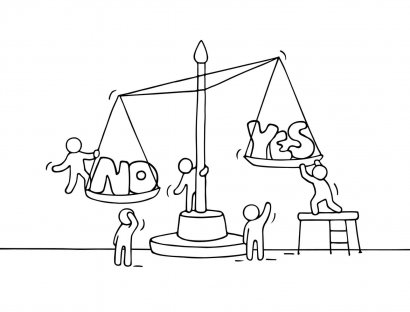 Relativism is a philosophical current that is based on one idea: absolute truth does not exist. In other words, truth is relative, in the sense that the concept of truth depends on variable criteria (scientific theories, personal evaluations or cultural traditions).
Relativism is a philosophical current that is based on one idea: absolute truth does not exist. In other words, truth is relative, in the sense that the concept of truth depends on variable criteria (scientific theories, personal evaluations or cultural traditions).
The concept of relativism is opposed to that of dogmatism, which is the intellectual approach that defends the existence of a truth or dogma as a fundamental principle.
Moral relativism
The human being cannot avoid evaluating behavior ethically. This implies that we consider something to be good or bad for some reason. From the relativistic perspective, moral evaluations are subject to a world view and, therefore, there are as many world views as there are cultures or individuals. Consequently, affirming that something is good or bad is a matter of circumstances that determine moral judgments.
Relativism is an attitude
Relativism has at its origin a philosophical dimension, both in relation to knowledge and in relation to morality. However, this approach goes beyond the philosophical terrain. In fact, it could be said that relativism is a way of looking at reality or, in other words, a vital attitude.
Thus, whoever considers himself a relativist understands that his truth is based on his own idea of truth and is not the truth in capital letters. The relativist is aware of the influence of his cultural environment on his ideas. In this sense, he understands that other people have different opinions, since they also live different circumstances.
The individual who defends relativism moves away from dogmatic positions and tends towards tolerance
 This intellectual attitude has a clearly positive aspect: it avoids fanaticism and any ideology based on absolute truths. If someone sees reality with a relativistic gaze, they do not believe that their culture, their country or their ideas are the best. However, the spirit of relativism has a certain "danger": the tendency to accept nothing as valid, since everything is relative.
This intellectual attitude has a clearly positive aspect: it avoids fanaticism and any ideology based on absolute truths. If someone sees reality with a relativistic gaze, they do not believe that their culture, their country or their ideas are the best. However, the spirit of relativism has a certain "danger": the tendency to accept nothing as valid, since everything is relative.
If this intellectual approach or attitude of life is taken to the extreme it is possible that practically any position can be justified. In fact, in a strict sense relativism is contradictory, since by affirming that the truth does not exist, a truth is already being affirmed.
The "weaknesses" of relativism make it a current rejected from various fronts, especially from religious approaches based on fundamental principles.









